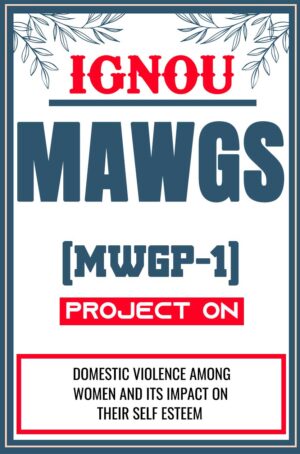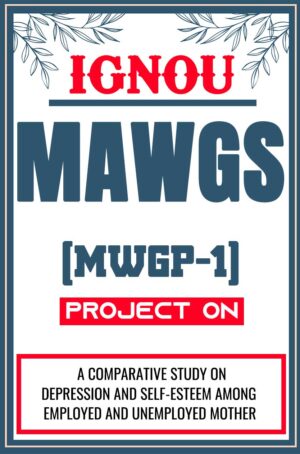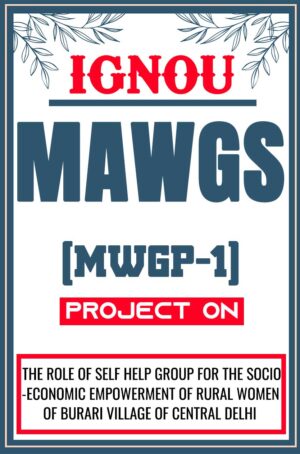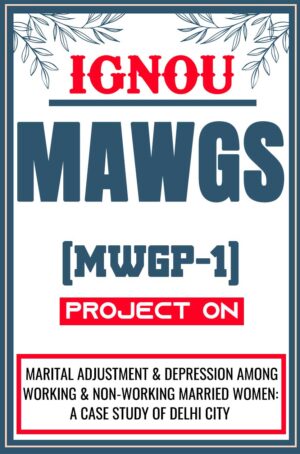Buy IGNOU MAWGS Project for MWGP 1
The IGNOU MAWGS Project is a key component of the Master of Arts in Women’s and Gender Studies program, which aims to engage students in independent research within the field. The IGNOU MAWGS Project allows learners to explore and critically analyze topics related to gender, feminism, social justice, and the lived experiences of women and marginalized genders.
Whatsapp us to get the Personalized (Customized) IGNOU MAWGS Project Report and Synopsis
Download PDF Link for IGNOU MAWGS Project (MWGP 1)
Throughout the project, students are expected to demonstrate research skills, including data collection (qualitative or quantitative), analysis, and the ability to present findings in a structured report. The aim is to foster critical thinking, research aptitude, and the practical application of gender studies knowledge.
The MWGP 1 project culminates in a dissertation, which is evaluated based on originality, depth of research, and relevance to gender studies. This project serves as a stepping stone for further academic research or professional roles in advocacy, policy, and social work.
How to Successfully execute your IGNOU MAWGS Project?
- Choose a Compelling Topic: Choose a topic that is not only interesting to you, but also important and significant to women’s and gender studies research.
- Conduct thorough research: Immerse yourself in comprehensive study to obtain diverse opinions and data about your chosen topic.
- Create a detailed project proposal: Create a clear and structured proposal that outlines your study aims, methodology, and potential results.
- Choose an appropriate research methodology for your topic, whether qualitative, quantitative, or a combination of the two.
- Organize Your Project Logically: Your project should have an introduction, literature review, methodology, analysis, and conclusion.
- Write, Revise, and Refine: Start crafting your project and keep refining your ideas and findings to ensure clarity and depth.
- Proofread and edit thoroughly: Ensure that your project is error-free and properly referenced.
- Confidently Submit Your Work: Submit your project with the confidence that comes from knowing you did your best.
What are the criteria for a good IGNOU MAWGS Project report?
A good project report for the IGNOU MAWGS should meet several key criteria to ensure it is comprehensive, well-organized, and academically rigorous:
- Clear Objectives and Scope: The report should clearly define the research objectives, questions, and scope. It should articulate the significance of the study and its relevance to the field of women’s and gender studies.
- Literature Review: A thorough literature review is essential. It should summarize existing research related to your topic, identify gaps, and situate your study within the broader academic discourse.
- Methodology: The methodology section should detail the research design, data collection methods, and analytical techniques. It should explain why these methods were chosen and how they are appropriate for addressing the research questions.
- Data Presentation and Analysis: Present and analyze your data clearly and systematically. Use appropriate tools, charts, and tables to illustrate findings. Ensure that your analysis is linked to your research questions and objectives.
- Discussion and Interpretation: Discuss the implications of your findings in relation to existing literature. Interpret the results, considering their broader impact on gender studies and practical applications.
- Conclusion: Summarize the key findings, contributions to the field, and any recommendations for future research or policy.
- References and Citations: Ensure proper citation of all sources used in your research. Follow a consistent citation style as per academic standards.
- Presentation and Formatting: The report should be well-organized, with a clear structure, including an introduction, methodology, findings, discussion, and conclusion. Follow any specific formatting guidelines provided by IGNOU.
- Originality and Critical Thinking: Demonstrate originality in your research and critical thinking throughout the report. Your analysis should reflect a deep engagement with the topic and a thoughtful examination of the issues.
- Proofreading and Editing: Ensure the report is free from grammatical errors, typos, and formatting inconsistencies. A well-edited report enhances readability and professionalism.
Samples of IGNOU MAWGS Project for MWGP 1
- Stress and anxiety among working and non-working women and its impact on their psychological health
- Marital adjustment and depression among working and non-working married women: a case study of xyz city
- The role of self-help group for the socio-economic empowerment of rural women of burari village of central Delhi
- A correlational study on marital adjustment and depression among employed and non-employed women
- A comparative study on depression and self-esteem among employed and unemployed mother
- Personality trait and emotional maturity among children of working and non-working mothers
- Domestic violence among women and its impact on their self esteem
How can you ensure that your IGNOU MAWGS Project topic aligns with the broader goals of women’s and gender studies?
To ensure that your project topic aligns with the broader goals of women’s and gender studies, consider the following strategies:
- Understand the Core Goals: Familiarize yourself with the fundamental goals of women’s and gender studies, which often include examining gender inequality, advocating for social justice, exploring intersectional identities, and analyzing power structures.
- Literature Review: Conduct a thorough review of existing literature in women’s and gender studies. Identify key themes, gaps in research, and emerging trends. This will help you position your topic within the current discourse and ensure its relevance.
- Relevance to Social Issues: Choose a topic that addresses contemporary social issues related to gender. This could involve exploring areas such as gender-based violence, reproductive rights, gender and work, LGBTQ+ issues, or intersectionality.
- Consult Academic Advisors: Discuss your project ideas with academic advisors or mentors in the field. They can provide valuable insights and help you refine your topic to ensure it aligns with the program’s objectives.
- Theoretical Frameworks: Select appropriate theoretical frameworks that are central to women’s and gender studies, such as feminist theory, queer theory, or intersectionality. Applying these frameworks can ensure that your analysis is grounded in relevant academic perspectives.
- Research Questions: Formulate research questions that contribute to understanding and addressing gender-related issues. Ensure that your questions are specific, researchable, and aligned with the goals of the field.
- Practical Impact: Consider the potential impact of your research on policy, practice, or community understanding. Projects that offer practical solutions or contribute to advocacy can align well with the goals of gender studies.
- Interdisciplinary Approach: Be open to interdisciplinary approaches that integrate insights from sociology, anthropology, law, and other fields. This can enrich your project and enhance its alignment with broader academic and social goals.
What are the potential challenges and limitations of your IGNOU MAWGS Project research approach?
When conducting research in women’s and gender studies, several potential challenges and limitations might arise, depending on your research approach. Here are some common ones to consider:
1. Access to Participants
- Challenge: Gaining access to participants, especially in sensitive topics like gender-based violence or marginalized communities, can be difficult.
- Limitation: Limited access may restrict the breadth and depth of your data, affecting the representativeness of your findings.
2. Ethical Concerns
- Challenge: Researching sensitive issues often involves complex ethical considerations, such as ensuring informed consent and protecting confidentiality.
- Limitation: Navigating these ethical concerns can limit the scope of your research or require additional time and resources.
3. Bias and Subjectivity
- Challenge: Personal biases and subjectivity can influence data interpretation and analysis.
- Limitation: This can affect the objectivity of your findings and their generalizability to broader contexts.
4. Theoretical Framework Limitations
- Challenge: Choosing a theoretical framework that may not fully capture the complexity of your research topic.
- Limitation: This can constrain your analysis and limit the insights gained from your study.
5. Data Quality and Reliability
- Challenge: Ensuring the reliability and validity of qualitative or quantitative data can be challenging, especially when working with self-reported data.
- Limitation: Issues with data quality can affect the credibility and accuracy of your findings.
6. Scope and Focus
- Challenge: Balancing the scope of your research with practical constraints such as time and resources.
- Limitation: A narrow focus might miss important aspects of the topic, while a broad scope might be difficult to manage within the project’s constraints.
7. Interdisciplinary Integration
- Challenge: Integrating insights from various disciplines can be complex and may require additional expertise.
- Limitation: Inadequate integration might weaken the overall analysis and relevance of your research.
8. Socio-Political Context
- Challenge: Socio-political contexts and cultural norms can influence both the conduct of research and its reception.
- Limitation: These factors can impact the feasibility of your research and the applicability of your findings.
9. Time Constraints
- Challenge: Limited time for conducting research, especially if fieldwork is involved.
- Limitation: Time constraints can impact the depth of your research and analysis.
10. Resource Availability
- Challenge: Limited access to resources such as funding, research tools, or literature.
- Limitation: This can constrain the scope and quality of your research.
What are the different types of data that can be used for an IGNOU MAWGS Project?
For a MAWGS (Master of Arts in Women’s and Gender Studies) project, you can use a variety of data types depending on your research question, methodology, and objectives. Here are the different types of data you might consider:
Qualitative Data
- Interviews: In-depth, semi-structured, or structured interviews with individuals or groups to gather personal experiences, opinions, and insights.
- Focus Groups: Group discussions to explore perceptions and attitudes on specific gender-related topics.
- Case Studies: Detailed examination of specific instances or cases related to gender issues.
- Observations: Systematic observation of behaviors, events, or interactions in natural settings.
Quantitative Data
- Surveys and Questionnaires: Structured tools to collect numerical data on attitudes, behaviors, or experiences related to gender issues.
- Statistical Data: Secondary data from governmental or organizational reports, censuses, or research studies providing statistical insights into gender-related phenomena.
- Experiments: Controlled studies to test hypotheses about gender-related variables.
Mixed Methods Data
- Combination of Qualitative and Quantitative: Integrating both qualitative and quantitative approaches to provide a comprehensive understanding of the research topic.
Secondary Data
- Literature Review: Analysis of existing research articles, books, reports, and academic papers relevant to your topic.
- Historical Records: Data from historical documents or archival materials related to gender issues.
Visual and Media Data
- Media Analysis: Examination of media content such as news articles, advertisements, and social media posts to analyze representations and discourses related to gender.
- Photographs and Videos: Visual materials that can be analyzed to understand gender representations and narratives.
Document Analysis
- Policy Documents: Analysis of government or organizational policies, legislation, and regulations related to gender issues.
- Personal Narratives: Diaries, autobiographies, or personal stories that provide insights into individual experiences.
Ethnographic Data
- Fieldwork: Long-term engagement with a community or group to understand their social practices, norms, and gender dynamics.
Digital Data
- Online Surveys: Digital platforms for collecting responses from a wide audience.
- Social Media Analytics: Data from social media platforms to study trends, discussions, and public opinions on gender-related topics.
How can you ensure the reliability and validity of your data for IGNOU MAWGS Project?
Ensuring the reliability and validity of your data is crucial for producing credible and robust research findings. Here are strategies to enhance both:
Ensuring Reliability
Consistent Data Collection Procedures:
- Standardize Methods: Use consistent methods and tools for data collection to minimize variability. For example, use the same survey questions or interview protocols for all participants.
- Pilot Testing: Conduct a pilot study to test your data collection instruments and make necessary adjustments before full-scale data collection.
Training and Calibration:
- Training: Train all researchers or data collectors to ensure they understand and follow the data collection procedures accurately.
- Calibration: Regularly calibrate measurement tools and instruments to maintain consistency.
Multiple Data Sources:
- Triangulation: Use multiple data sources or methods to cross-verify findings. For instance, combine qualitative interviews with quantitative surveys to corroborate results.
Repeatability:
- Replicate Studies: If possible, replicate your study under similar conditions to verify that results are consistent over time.
Ensuring Validity
Clear Research Design:
- Define Variables: Clearly define and operationalize your variables and constructs to ensure that your data accurately measures what you intend to study.
- Appropriate Methods: Choose research methods and tools that are well-suited to your research questions and objectives.
Validity of Measurement Instruments:
- Content Validity: Ensure that your measurement instruments cover all aspects of the construct being measured. This can be achieved through expert reviews or literature review.
- Construct Validity: Verify that your instruments accurately measure the theoretical constructs they are intended to measure. This can involve testing for convergent and discriminant validity.
Control for Bias:
- Avoiding Bias: Implement strategies to minimize researcher bias, such as using blind or double-blind procedures where applicable.
- Sampling: Use random or stratified sampling techniques to ensure that your sample is representative of the population.
Data Analysis:
- Appropriate Techniques: Apply statistical or analytical techniques that are appropriate for your data type and research design.
- Check for Consistency: Analyze data for consistency and identify any anomalies that might indicate issues with validity.
Feedback and Review:
- Peer Review: Seek feedback from peers or advisors to review your research design, instruments, and analysis for potential validity issues.
- Reflective Practice: Regularly reflect on your research process and decisions to identify and address any potential validity concerns.
Ready to get your IGNOU MAWGS Project Report and Synopsis Sample PDF for MWGP 1?
- Call us or WhatsApp us at: 9958947060, 9354637830
- Visit: SHRICHAKRADHAR.COM
-
Sale!

-
Sale!

IGNOU MAWGS Project (MWGP-1) Synopsis/Proposal & Project Report/Dissertation in Hard-Copy (Sample-6)
Original price was: ₹499.00.₹249.00Current price is: ₹249.00. -
Sale!

IGNOU MAWGS Project (MWGP-1) Synopsis/Proposal & Project Report/Dissertation in Hard-Copy (Sample-5)
Original price was: ₹499.00.₹249.00Current price is: ₹249.00. -
Sale!

IGNOU MAWGS Project (MWGP-1) Synopsis/Proposal & Project Report/Dissertation in Hard-Copy (Sample-4)
Original price was: ₹499.00.₹249.00Current price is: ₹249.00. -
Sale!

IGNOU MAWGS Project (MWGP-1) Synopsis/Proposal & Project Report/Dissertation in Hard-Copy (Sample-3)
Original price was: ₹499.00.₹249.00Current price is: ₹249.00. -
Sale!

IGNOU MAWGS Project (MWGP-1) Synopsis/Proposal & Project Report/Dissertation in Hard-Copy (Sample-2)
Original price was: ₹499.00.₹249.00Current price is: ₹249.00. -
Sale!

IGNOU MAWGS Project (MWGP-1) Synopsis/Proposal & Project Report/Dissertation in Hard-Copy (Sample-1)
Original price was: ₹499.00.₹249.00Current price is: ₹249.00.
